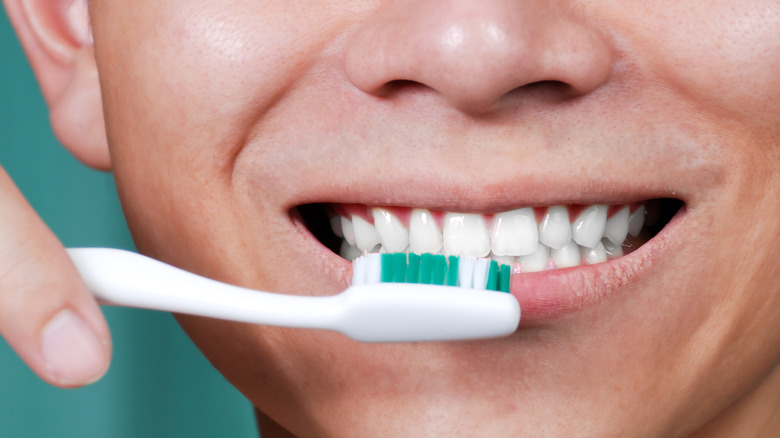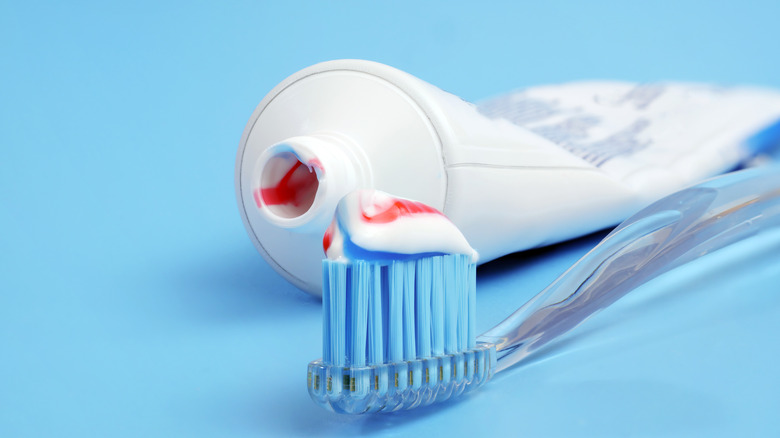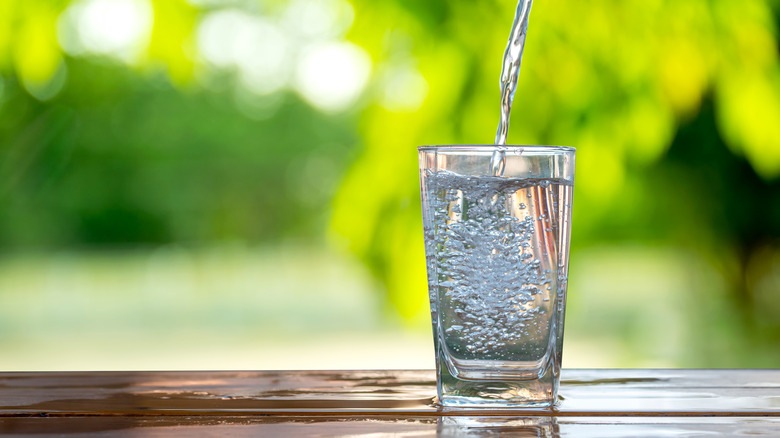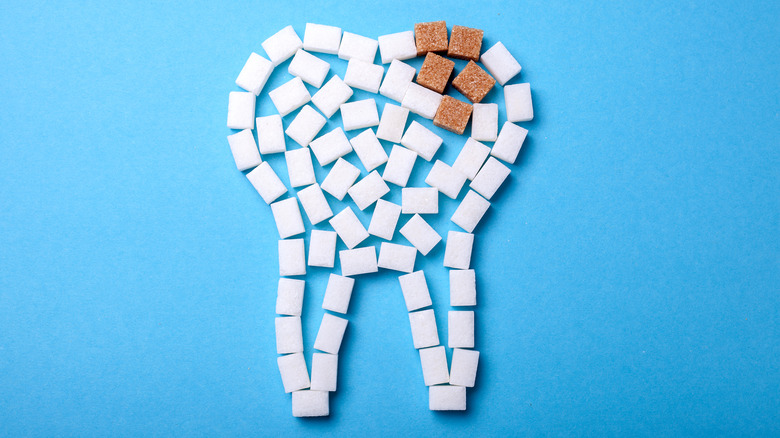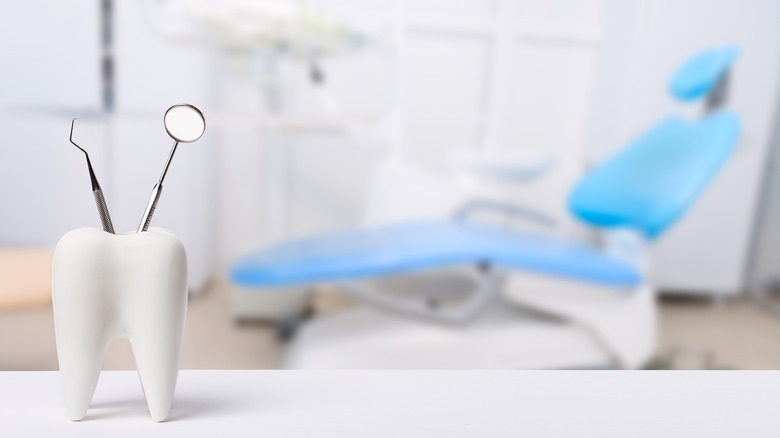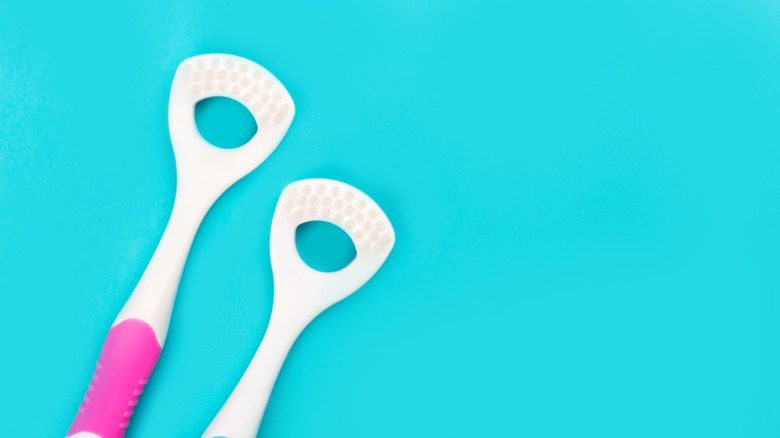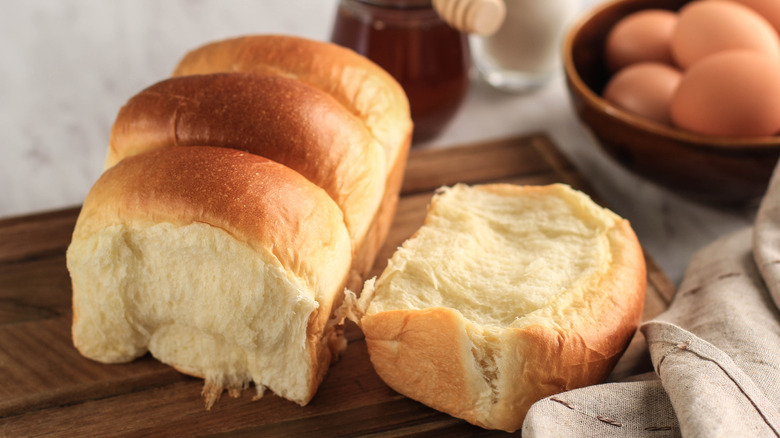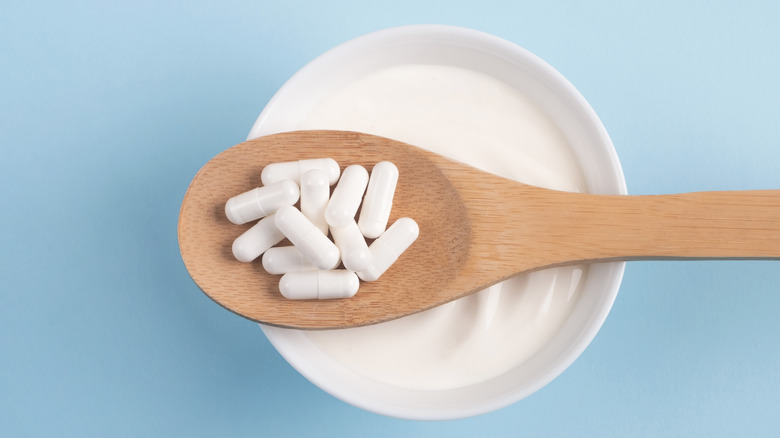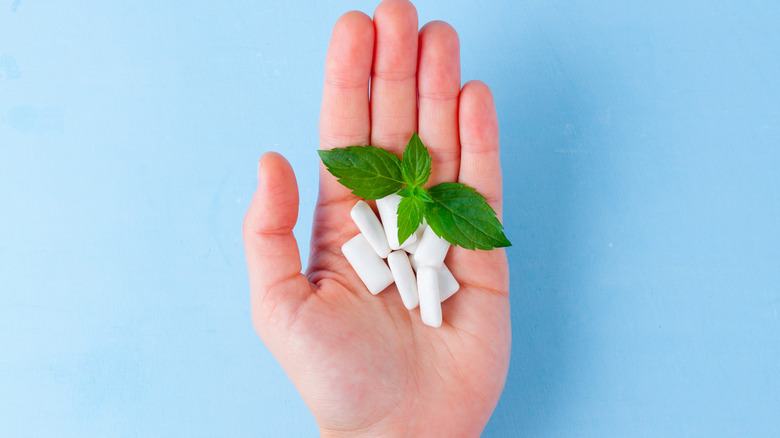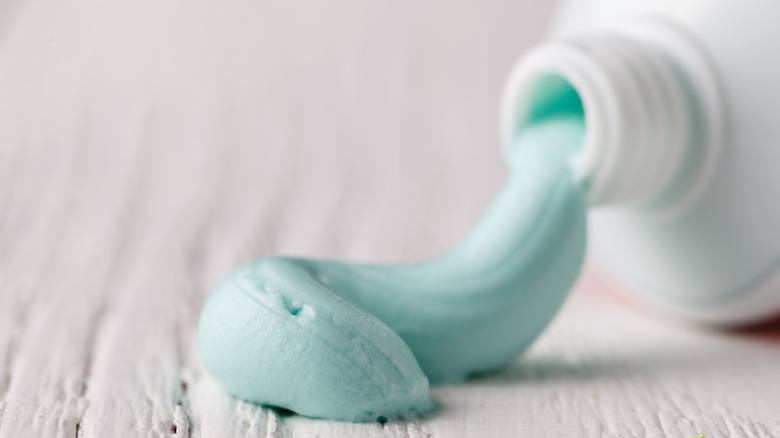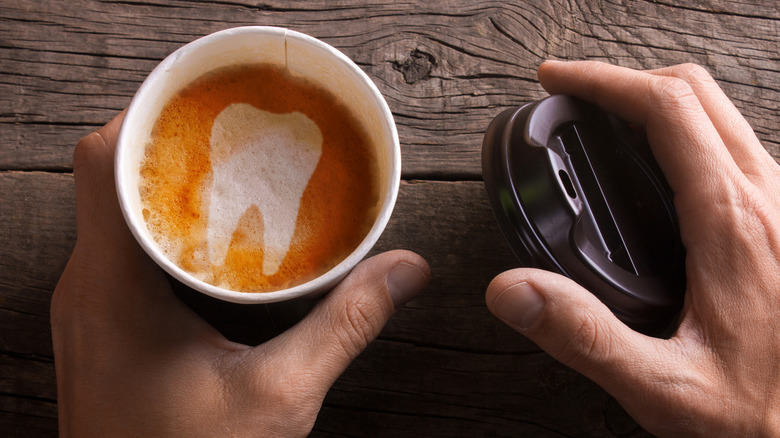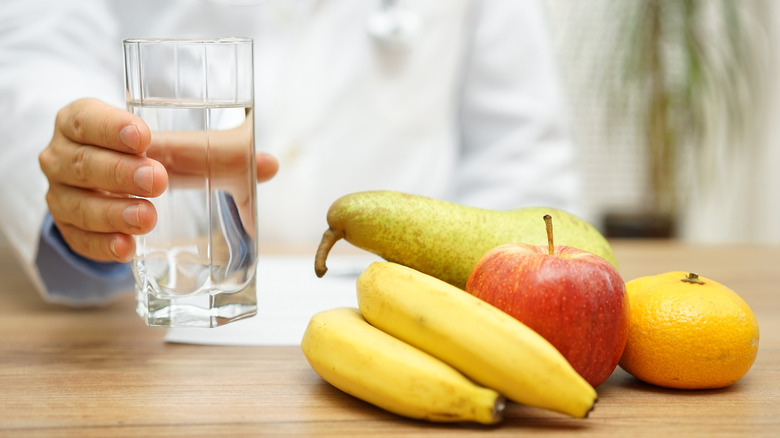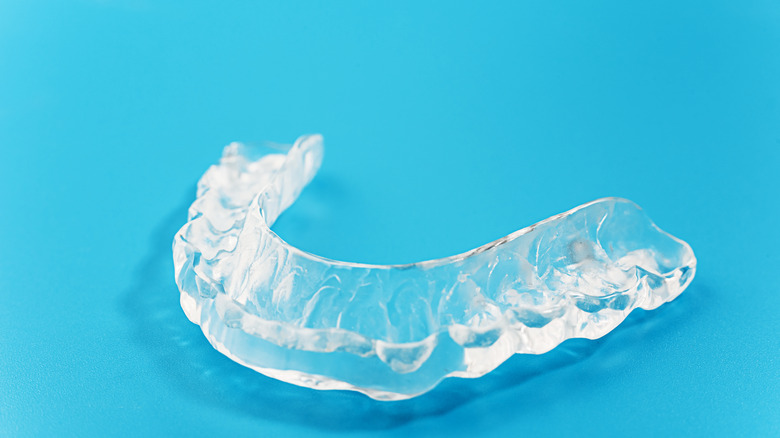Things That Will Actually Help To Strengthen Your Teeth
Let's be real: our teeth put up with a lot. Between crunching through hard foods, enduring daily onslaughts of tea, coffee, and other dark liquids, and being brushed twice a day, it's a part of our body that sees an awful lot of front-line action. That's why doing what we can to keep them strong and healthy is vital. Yet, despite this, all too many of us are wary of showing off our teeth due to how they look. Over a third of young adults in the U.S. feel embarrassment due to the condition their teeth are in, while one in four American adults are so self-conscious about their teeth that they avoid smiling completely, according to the results of a survey from the ADA.
It's important to remember that a healthy smile isn't just about the whiteness of our teeth: it's also about their health and their strength. Our teeth and their strength are hugely affected by our daily choices, and there are some basic, easy things we can incorporate into our lifestyles to keep our chompers strong and healthy. Let's take a look at some of the top things that will actually help to strengthen our teeth.
Make sure you're eating your greens
How many times, when you were growing up, did you hear that drinking milk would make your teeth strong? There's a truth in this mantra. Our diet is inextricably linked to our tooth health, and milk is an excellent and readily available source of calcium — a mineral essential for tooth strength — as Colgate points out.
But, milk isn't the only way to get your calcium fix: green leafy vegetables are another great source. Collard greens, for example, are "high in calcium, which is important for bone building, blood clotting, and nerve and cardiac function," as well as tooth strength, advises registered dietitian nutritionist and co-founder of Amenta Nutrition, April Panitz, to Eat This, Not That!. Through their nutritional content, collards and other greens help to reinforce the enamel on our teeth, protecting them from the bacteria that can form cavities, as well as help to protect us from gum disease, according to Unique Dental Care.
Not getting enough calcium can increase the likelihood of tooth loss, as well as affect our bone health and lead to an increased risk of osteoporosis and low bone mass (per Medical News Today). As it's difficult to spot a calcium deficiency until it's too late, make sure you're acting now by eating your greens, to keep your mouth and your skeleton safe.
Use a fluoride toothpaste
Fluoride is a word that's thrown around a lot when it comes to tooth health, but, if you're like us, sometimes you're a little confused by what it actually is and what it does. A naturally occurring mineral, fluoride works to build back up the layers of minerals on our teeth that repair the layer of enamel and protect the teeth from harm from acids formed by bacteria, a process known as remineralization (via WebMD).
While fluoride is naturally present in many foods, as well as water, it's also a key component of many kinds of toothpaste, and seeking out a toothpaste that contains fluoride can provide powerful benefits for your tooth health. The evidence on this is pretty clear, as shown by a comprehensive 2019 review published by Cochrane Library. The review looked at 96 separate studies over almost 60 years, and concluded that toothpaste containing fluoride demonstrates significantly more effective benefits for tooth health than those without, both in adults and younger children. Fluoride is also present in notable quantities in foods like spinach, potatoes, grapes, raisins, and (breathe a sigh of relief) wine, according to Strong Smiles Dental Care.
Simply drinking water has powerful benefits for teeth
Drinking more water is pretty much the first thing we should do when it comes to ... well, anything in life. The same is true for the strength of your teeth. Staying hydrated is one of your first lines of defense for your teeth for several reasons, as drinking water throughout the day helps to rinse away acid and food residue that can build up after eating, keeping your teeth clean, according to Warwick Lodge Dental and Implant Centre. Drinking water also helps to clear away any sugars and bacteria present in your mouth which, together, form the bacteria that can eat away at your enamel and cause cavities.
Water also contains fluoride, a powerful mineral that plays a vital role in strengthening teeth and preventing cavities, as Mouth Healthy points out. Fluoride's effects on tooth health through drinking water, specifically, were shown in a study published in Community Dentistry and Oral Epidemiology. The study examined data on tooth decay rates from two cities in Alberta, Canada: Calgary, which stopped putting fluoride in its drinking water in 2011, and Edmonton, which continued to practice fluoridation. The data found that tooth decay amongst children was higher in Calgary than in Edmonton, indicating the effect of fluoridated water on keeping our teeth healthy.
Avoid overbrushing
We're taught from pretty much day one that brushing our teeth is important. Now, we're not disputing that, but you can get too much of a good thing. While brushing vigorously can feel as though we've giving our teeth a really good clean, going too hard can wear down the enamel on the teeth and weaken them, as well as pushing the gums back and exposing the tooth's root, says Delta Dental.
What's more, a huge amount of pressure isn't needed when we're brushing our teeth. "Plaque is so soft that you could remove it with a rag if you could reach all the surfaces where it hides," says Delta Dental's director of professional services Kevin Sheu. "Thoroughness is what is required for plaque removal, not aggressive brushing. You're not going to achieve any extra benefit by brushing hard." If you're worried that you've been overbrushing your teeth, there are some simple steps you can take to pull back. Opt for a soft-bristled toothbrush and a toothpaste that's high in calcium and fluoride instead of one with harsh abrasive agents in them, says Colgate. In addition, try and wait at least an hour after eating before brushing your teeth, especially if you've eaten something acidic.
Try not to eat too much sugar
This is pretty much the gold-standard rule for all tooth health and, particularly, when it comes to keeping your teeth strong. Sugar can wreak havoc on your teeth by eating away at the enamel covering and protecting them, says Colgate. When we eat foods high in sugar, the fermentable carbohydrates that end up in our mouths interact with the bacteria there to create acids. These acids then erode the enamel on our teeth, making our teeth weaker and eventually leading to tooth decay and contributing to tooth sensitivity.
Cutting down on sugar is easier said than done, but there are some simple lifestyle changes you can make to protect the strength and health of your teeth. Try subbing out sugary sodas for water; not only will this reduce the amount of sugar coming into contact with your teeth, but the water will also help wash away acids that can be formed by bacteria. You can also keep a toothbrush and floss handy, in your car or your desk at work, to give your teeth a quick brush when you're on the go, which can help to get rid of any sugars you may have consumed still present in your mouth.
Visit your dentist to remineralize your teeth
Our tooth enamel is made up of a high concentration of minerals, and it's these minerals that give it its strength, according to Riverstone Dental Care. However, as we go through our daily routines, eating and drinking things that might not be amazing for our teeth, we usher in acids and bacteria that strip away these minerals, a process known as demineralization, as Shape notes. Demineralization naturally also occurs with age and, combined with the effects of our diet, over time, our teeth get less mineral-y and weaker.
The good news is you can get these precious minerals back! If you're concerned about demineralization, heading to your dentist to start a remineralization treatment can be a great idea. Your dentist might use a fluoride treatment in a gel, rinse, or foam form, which protects your teeth by supplying them with a higher concentration than a regular fluoride toothpaste will. They may also apply a sealant to your teeth to protect them from damage (particularly if you're showing signs of tooth decay). Finally, your dentist may use an MI paste that contains a concentrate of calcium, phosphate, and milk protein to help re-strengthen your teeth, according to NYC-based oral health expert Jonathan B. Levine.
Cleaning your tongue is great for tooth strength
We tend to focus on teeth as the primary concern when it comes to oral health, but your mouth is more than just your pearly whites. Interestingly, your tongue plays a large role in the strength of your teeth. In addition to being what we taste our food with, "your tongue can also harbor bacteria," states dental hygienist Tenika Patterson to Cleveland Clinic. And this bacteria, which may not be shifted by regular brushing, can interact with our teeth negatively, weakening their enamel and causing tooth decay.
That's why cleaning your tongue, as well as your teeth, is vital. Patterson advises using a specially-designed tongue scraper to do this, as opposed to just scrubbing it with your toothbrush. "Brushing is OK to do, but think about it this way — if your carpet is dirty and you scrub it, the dirt's going to get embedded down in there," she says. Instead, "if you scrape it, it's going to come right off the surface." As well as helping our teeth stay strong, getting rid of the bacteria on our tongue can also keep bad breath at bay way more than brushing alone.
To make your teeth stronger, avoid starchy carbs
Potatoes, rice, pasta, bread, chips ... why must all the good things in life come at a cost? We hate to be the bearers of bad news, folks, but these starchy carbs are pretty much the worst enemy of your teeth and can weaken them considerably. Starchy carbs have a habit of getting stuck in your teeth and, once there the sugars present in them, can create opportunities for the bacteria in your mouth to thrive, creating acids, states the University of Rochester Medical Center. These acids then demineralize your teeth, leeching them of the substances that keep them strong and healthy, states Leeds City Dental Care.
This is, understandably, devastating news to carbs lovers (like us). However, as always, there are simple steps you can take to reduce their impact and keep your teeth strong. Instead of simple carbs, try prioritizing carbs that are high in fiber, as well as fruit and vegetables with good fiber content. This fiber helps to keep your gums and teeth clean, as well as helping to stimulate saliva production, which can help to minimize the impact of acids and bacteria on your tooth enamel.
Make sure you take your probiotics
It sort of flies in the face of logic to recommend generating bacteria to protect against bacteria but, hey, we're quirky like that. More specifically, taking probiotics that can help support good gut bacteria could be a powerful defense against dental decay, according to United Concordia. Probiotic use can help to restore the balance of good bacteria in the mouth, which can help to prevent plaque in a manner that isn't as effective through traditional dental treatments alone, according to a study published in Current Oral Health Reports.
Not only that, but the bacteria supported by probiotics can also help to reduce bad breath, as well as combat gingivitis symptoms, advises Healthline. Perhaps most notable, though, is their potential benefit to the lowering risk of oral cancer. A study published in Cancer Prevention Research found that certain probiotic use amongst rats demonstrated their apparent effectiveness in the prevention of oral cancer, although it was noted by the study's authors that further study is needed.
Buy a pack of gum
A humble pack of gum isn't just going to keep your breath fresh, it might keep your teeth strong too. While certain types of gum are packed with sugar and can be super damaging to your teeth, sugar-free gum can help to promote saliva production in your mouth, says the Oral Health Foundation. This saliva not only helps to strengthen your teeth, but it also helps to clear your mouth of food, harmful bacteria, and acid, all of which can hit your teeth hard, states Colgate.
Many gums also contain a star ingredient that your teeth will love. Xylitol, a natural sweetener commonly used in sugar-free products, may help to reduce the levels of harmful bacteria in your mouth that can cause tooth decay, as shown in a review of studies published in the Journal of Natural Science, Biology and Medicine. The xylitol in gum products can also help to neutralize harmful acids in your mouth that could weaken your tooth enamel.
A remineralizing toothpaste can strengthen your teeth
The toothpaste you choose has powerful consequences on your tooth strength. Tubes of toothpaste that are designed to remineralize the teeth, strengthening the enamel with minerals that may have been lost, are readily available and can be a vital tool in your arsenal in the fight to keep your teeth healthy. These kinds of toothpaste generally contain active ingredients like sodium fluoride, stannous fluoride, and/or calcium phosphate, all of which work on the teeth to patch up sports where minerals have been lost, as Healthline states.
If you're a little overwhelmed by the choices out there, Crest Pro-Health Advanced is a great all-rounder that uses stannous fluoride as its active ingredient to help protect your teeth. It's also worth talking to your dentist to discuss your options, as they may suggest other remineralization treatments if they think it necessary. It's important to remember that these kinds of toothpaste won't rebuild the enamel itself, as it's not living tissue, as WebMD says. So, if you're concerned about enamel loss or are experiencing pain or discomfort, visiting your dentist should be higher up on your priority list than buying a special toothpaste.
Try to avoid drinking too much coffee
Okay, now we know this won't be a popular opinion, but it turns out that cutting down on your coffee intake could help your teeth stay strong. The problem comes with the fact that coffee is acidic, as Ethos Orthodontics states. This acidity (in any food or drink which is acidic, like various fruits and fizzy drinks) can cause erosion to your tooth enamel, which then makes your teeth more brittle and prone to damage.
Remember, although coffee can cause your teeth to stain and become yellow through their tannin content becoming stuck to your teeth, this staining isn't what's causing damage in itself, as White Horse Dental points out. However, teeth can appear more yellow as enamel is eroded, as this can expose the dentin underneath. While coffee stains can be usually cleared up in a dentist's chair, it's the acid you need to watch out for. Try and drink a glass of water after having a cup of coffee to help clear away the acidity, and wait 15 minutes after drinking a cup of coffee in the morning before you brush your teeth, so that your enamel can re-harden after the acid comes into contact with it.
Make sure your mouth doesn't get too dry
We've all suffered from a dry mouth now and again, but if you find yourself with one with too much frequency, you might want to think about how it's impacting your teeth. A dry mouth, as you might suspect, indicates a lack of saliva, which plays a vital function in the strengthening of teeth. More specifically, the saliva in your mouth works to reduce the effects of acid on your teeth and helps with remineralization, as this review from the International Journal of Nanomedicine shows.
Sometimes, though, it isn't as simple as just drinking more water to get some moisture going. While a dry mouth might well indicate dehydration, it may well also be indicative of a wealth of health conditions, including nerve damage, diabetes, Alzheimer's, and a reaction to various medications, as the Mayo Clinic points out. A dry mouth can also be a result of tobacco, alcohol, or recreational drug use. If you have any concerns about having a dry mouth, it's best to get in touch with your doctor as soon as possible.
Be aware of grinding your teeth
Tension can creep into every part of our body, including our facial muscles, and can often result in tooth clenching or grinding. Unfortunately, tooth grinding (also known as bruxism) can be pretty damaging to your teeth, wearing them down and reducing their strength due to loss of enamel or structural damage, according to WebMD. Frustratingly, bruxism can also occur during sleep, making it harder to identify and treat. In the most extreme cases, tooth grinding can result in tooth loss, jaw damage, and even change your facial appearance.
Though bruxism can be a stressful experience, there are ways in which it can be treated. Identifying lifestyle factors that could be contributing to it, such as the use of tobacco or alcohol, or understanding how it might manifest due to stress or anxiety could be the first step, says Colgate. If you're grinding your teeth in your sleep, discussing the use of a mouth guard with your dentist might be a good step. Bear in mind that signs of bruxism in your sleep might not just be limited to damage to your teeth: waking up with a headache or jaw pain could be an early indicator.

